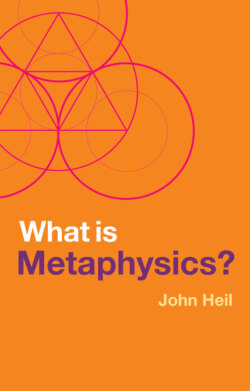Читать книгу What is Metaphysics? - John Heil - Страница 11
1.1 Metametaphysics
ОглавлениеYou might think that the place to begin would be with a definition of “metaphysics,” a succinct characterization that would give you some idea of what you are in for. Would that it were so. Definitions of subjects – mathematics, psychology, poetry, for instance – rarely assist those looking for help in discerning the nature of the subject matter. To the extent that they are intelligible to the nonspecialist, definitions tend to be vague and impressionistic. Psychology is the study of human behavior. Yes, but how does this distinguish psychology from biology, anthropology, or marketing? When precise definitions are available, they are most often of interest only to those already familiar with the subject.
I could tell you that metaphysics is the study of being or the nature of reality, but that does not set metaphysics off from hosts of other subjects including, but not limited to, the sciences. I could tell you that metaphysics provides our most general characterization of what there is, leaving more specific characterizations to the various sciences. But again, this does little to distinguish metaphysics from physics, the most general of the sciences.
Some suppose that metaphysics is distinguished from the sciences in being a priori: metaphysics endeavors to derive truths about reality from truths that require no further warrant, truths that are self-evident. If you want a model, think of Euclidean geometry in which theorems are deduced from a small number of axioms purporting to be self-evident. Physics, in contrast, like the other sciences, relies on a posteriori reasoning that begins and ends with empirical observation and investigation.
As the example of Euclidean geometry suggests, however, characterizing metaphysics as relying exclusively on reason would fail to distinguish metaphysics from mathematics. Mathematics is essential to the sciences, but unlike metaphysics, it has no worldly pretenses. Its utility depends not on its capturing truths about reality, but in description and calculation. In its simplest form, calculation takes, as inputs, truths or purported truths, and yields outputs that must be true if the inputs are true.
In putting it this way, I am skating over scores of important features of mathematics. My aim is not to show how or why mathematics works, however, but only to note that, if metaphysics were a priori it would be in good company.
But is metaphysics a priori? Not by my lights. Although metaphysics does not compete with the sciences – or, for that matter, with poetry or fiction – metaphysics seeks to provide a systematic account of categories indispensable to any endeavor to say what there is, and that is not something that could be arrived at by reason alone.
The last sentence is hopelessly abstract, but you can get a feel for what I have in mind by considering three historically central categories: substance, property, relation. Substances are objects possessing various properties and standing in various relations to one another. Take this tomato, a candidate substance. The tomato is a something that has various qualities, its properties. The tomato is red, roughly spherical, and has a definite mass, and stands in a variety of relations – the tomato is next to a beetroot, and on top of your kitchen counter.
